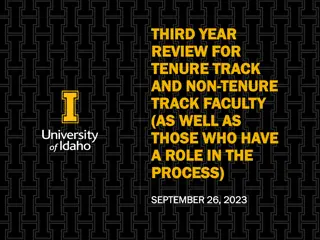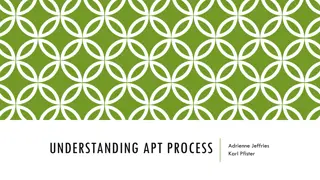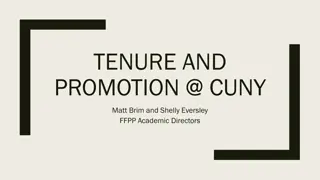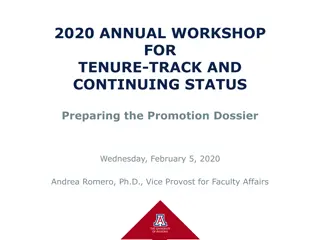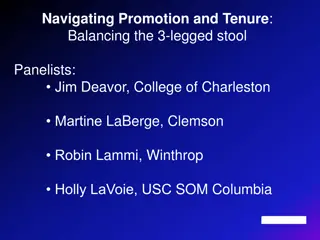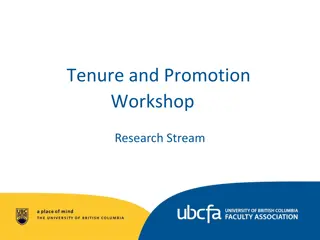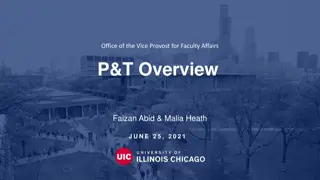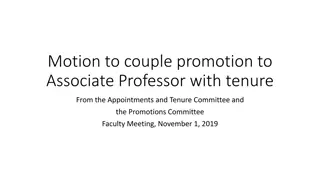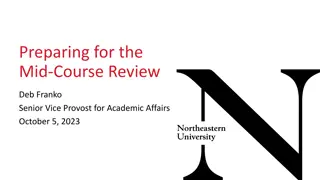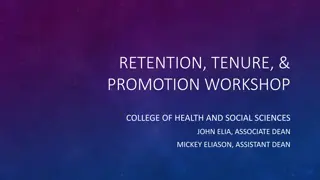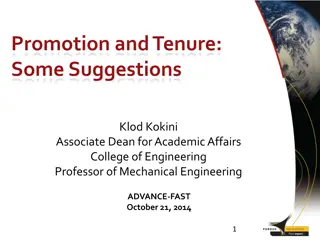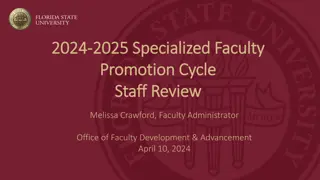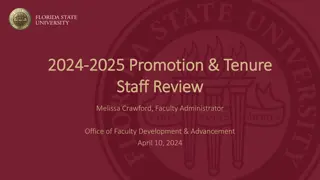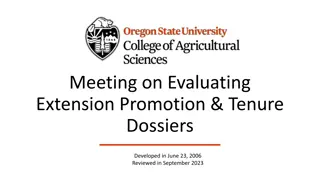MUSC College of Medicine Promotion and Tenure Process
The MUSC College of Medicine outlines the detailed process and criteria for appointments, promotions, and tenure. It involves submission of packets to committees, reviews by subcommittees and full committees, and final recommendations for approval or disapproval. Specific criteria are provided for faculty ranks such as Professor, Academic Investigator, Clinical Educator, and more. The process culminates in a final committee meeting to determine recommendations for the Dean.
Download Presentation

Please find below an Image/Link to download the presentation.
The content on the website is provided AS IS for your information and personal use only. It may not be sold, licensed, or shared on other websites without obtaining consent from the author. Download presentation by click this link. If you encounter any issues during the download, it is possible that the publisher has removed the file from their server.
E N D
Presentation Transcript
MUSC College of Medicine Appointments, Promotion, and Tenure Process and Procedures
Promotion Process Packets send to APT committee Packets distributed to Subcommittees Subcommittee chair assigns reviewers Subcommittee meets and recommends approval, disapproval or deferral Disapprovals and deferrals are reported to department chairs for additional information and rebuttal Full committee meets and discusses packets with votes for approval/disapproval recommendations Recommendations for disapproval are reported to the chairs with invitation to address the Committee in person Final Committee meeting determines final recommendations for the Dean
D. V-D - Criteria Matrix Ranks and Tracks R=Required S=Suggested COM FACULTY RANKS CRITERIA Under exceptional circumstances, promotions may be recommended when the candidate does not meet all of the basic criteria. These will be unusual cases. Professor Academic Investigator R Academic Inv/Ed R Academic Clinician R Clinician Educator R Continues to meet all the criteria for Associate Professor with major accomplishments in research, teaching, and/or clinical service Distinguished career exemplifying scholarship. Excellence & productivity in research, outstanding success as a teacher, and/or outstanding service contributions are required. Involved in teaching activities, including formal lectures, grand rounds, and/or continuing medical education. (Leadership in interprofessional teaching and interdisciplinary research encouraged)* Principal investigator on significant research grants Co-investigator on research grants. Direct involvement in research. Key individual in training of students, post-graduates and mentorship of junior faculty Serves as Course Director for one or more major courses Continues to carry a heavy clinical or teaching load Continued publication of reviews, chapters, textbooks, peer reviewed papers, and/or innovative teaching materials (new curricula, educational programs, syllabi, video materials, computer programs, etc.) that influence the science and practice of medicine at the regional & national levels Continued publication of important and original clinical and/or laboratory investigations with significant authorship. Publications with significant authorship since promotion to Associate Professor (line 1), and in total (line 2) Publications with authorship since promotion to Associate Professor (line 1), and in total (line 2) National recognition, as evidenced by election to generalist or specialty societies, service on national committees, study sections, editorial boards, visiting professorships, and/or invitations to speak in CME courses. Leadership roles in appropriate department, hospital and college R* R* R* R* R S R R R S R R R R R R R R R R R R R R R R 10 30 10 30 5 10 R 5 10 R R R R R R
Faculty Tracks Regular (4 with potential for tenure) Academic Investigator Academic Investigator / Educator Academic Clinician Clinician Educator Modified (4 without potential for tenure) Research Faculty Clinical Faculty
Academic Investigator For appointment as an Assistant Professor in this track, faculty are expected to have the appropriate training and attributes to enable them to excel in Research/Scholarship. For promotion from Assistant to Associate Professor (or for an initial MUSC appointment as Associate Professor), faculty members must demonstrate excellence in Research/Scholarship, and evidence of achievement in either Education/Teaching or Service/Leadership at the assistant professor rank, but participation in both is expected. For promotion to Professor (or for an initial MUSC appointment as Professor), faculty members must demonstrate excellence in Research/Scholarship and evidence of sustained achievement in Education/Teaching and Service/Leadership at the associate professor rank.
Research/Scholarship The following Research/Scholarship criteria are what the APT Committee might consider to be typical standards for appointment/promotion in this track (with understanding that some candidates will have scholarly productivity that is not typical). With respect to publications, a typical candidate for promotion will have 5 or more peer-reviewed primary research publications since last appointment/promotion with a significant authorship role (first or last authorship is assumed to be significant, as is corresponding authorship; the significance of contribution in cases of other positions of authorship must be explained). Exceptions could be made for impactful publications in the field (as supported by statements from external references or number of citations); patents filed based on the published work; honors/awards specifically for the published work; etc.
Education/Teaching Formal classroom teaching in the medical or graduate school curricula and serving as a course director have the most weight. Classroom teaching can include didactic lectures, leading discussion groups in student-led learning or problem-based learning, presentation of CME lectures, etc. Direct mentoring of trainees at all levels in the candidate s lab is an important component of Teaching but has lesser weight than classroom teaching because this is so deeply intertwined with Research/Scholarship. Membership on student qualifying exam or thesis committees falls within Teaching but is of even lower weight.
Service/Leadership Service includes activities within and external to the University. Common internal service roles include membership on committees at any level. External service commonly includes study section membership, conference organization, etc. Roles that involve a higher degree of leadership or responsibility should be identified as such. Because all of these can vary so widely in their scope of effort and responsibility, it is the responsibility of the candidate for promotion to provide sufficient information to the APT Committee to explain their roles in these service activities and to justify that their activities meet the criteria for participation vs. achievement vs. excellence.
2. ACADEMIC INVESTIGATOR/EDUCATOR For promotion from Assistant to Associate Professor (or for an initial MUSC appointment as Associate Professor), faculty members must demonstrate excellence in Education/Teaching, and evidence of achievement in either Research/Scholarship or Service/Leadership at the assistant professor rank, but participation in both is expected. For promotion to Professor (or for an initial MUSC appointment as Professor), faculty members must demonstrate excellence in Education/Teaching and evidence of sustained achievement in Research/Scholarship and Service/Leadership at the associate professor rank.
Education/Teaching Formal classroom teaching in the medical or graduate school curricula and serving as a course director have the most weight. Classroom teaching can include didactic lectures, leading discussion groups in student-led learning or problem- based learning, presentation of CME lectures, etc. Direct mentoring of trainees at all levels in the candidate s lab is an important component of Education/Teaching but has lesser weight than classroom teaching because this is so deeply intertwined with Research/Scholarship. Membership on student qualifying exam or thesis committees falls within Education/Teaching but is of even lower weight.
Research/Scholarship The following Research/Scholarship criteria are what the APT Committee might consider to be typical standards for appointment/promotion in this track (with understanding that some candidates will have scholarly productivity that is not typical). With respect to publications, a typical candidate for promotion will have 5 or more peer-reviewed academic publications since last appointment/promotion. Review papers, commentaries, case reports, book chapters, textbooks, and other types of publications are recognized to have merit in scholarship, and the type of publication for each publication listed as a scholarship accomplishment must be explicitly identified.
Service/Leadership Service/Leadership includes activities within and external to the University. Common internal service roles include membership on committees at any level. External service commonly includes study section membership, conference organization, etc. Roles that involve a higher degree of leadership or responsibility should be identified as such. Because all of these can vary so widely in their scope of effort and responsibility, it is the responsibility of the candidate for promotion to provide sufficient information to the APT Committee to explain their roles in these service activities and to justify that their activities meet the criteria for participation vs. achievement vs. excellence.
3. ACADEMIC CLINICIAN For promotion from Assistant to Associate Professor (or for an initial MUSC appointment as Associate Professor), faculty members must demonstrate excellence in Clinical Service and Research/Scholarship, and evidence of achievement in either Education/Teaching or Service/Leadership at the assistant professor rank, but participation in both is expected. For promotion to Professor (or for an initial MUSC appointment as Professor), faculty members must demonstrate excellence in Clinical Service and Research/Scholarship, and evidence of sustained achievement in Education/Teaching or Service/Leadership at the associate professor rank, but participation in both is expected.
Research/Scholarship The following Research/Scholarship criteria are what the APT Committee might consider to be typical standards for appointment/promotion in this track (with understanding that some candidates will have scholarly productivity that is not typical). With respect to publications, a typical candidate for promotion will have 5 or more peer-reviewed primary research publications since last appointment/promotion with a significant authorship role (first or last authorship is assumed to be significant, as is corresponding authorship; the significance of contribution in cases of other positions of authorship must be explained). Exceptions could be made for impactful publications in the field (as supported by statements from external references or number of citations); patents filed based on the published work; honors/awards specifically for the published work; etc. The impact factor of the journal is a consideration but not an absolute criteria of significance or impact of the publication.
Research/Scholarship With respect to funding, it would be unusual for a candidate for promotion to not hold current grant support. For promotion to Full Professor, evidence of sustained grant support is expected. A typical candidate for promotion will currently serve as PI or MPI on an NIH R01 or similar extramural award. Foundation grants and grants from industry are recognized as alternative sources of research support although usually of a lesser significance than an NIH R01
Clinical Service Influencing Clinical Practice such as development of innovative approaches to diagnosis, treatment, or prevention of disease, applications of technologies and/or models of care delivery that are recognized for influencing care at a regional and/or national level. Recognition as a Clinical Expert such as visiting professorships and invitations to speak nationally and, in some cases, internationally on issues related to area of clinical expertise. Leadership roles in national and, in some cases, international professional organizations related to an area of clinical expertise including leadership of national and/or international courses or programs.
Education/Teaching Formal classroom teaching in the medical or graduate school curricula and serving as a course director have the most weight. Classroom teaching can include didactic lectures, leading discussion groups in student-led learning or problem-based learning, presentation of CME lectures, etc. Direct mentoring of trainees at all levels in the candidate s lab is an important component of Education/Teaching but has lesser weight than classroom teaching because this is so deeply intertwined with Research/Scholarship. Membership on student qualifying exam or thesis committees falls within Education/Teaching but is of even lower weight.
Service/Leadership Service includes activities within and external to the University. Common internal service roles include membership on committees at any level. External service commonly includes study section membership, conference organization, etc. Roles that involve a higher degree of leadership or responsibility should be identified as such. Because all of these can vary so widely in their scope of effort and responsibility, it is the responsibility of the candidate for promotion to provide sufficient information to the APT Committee to explain their roles in these service activities and to justify that their activities meet the criteria for participation vs. achievement vs. excellence.
4. CLINICIAN EDUCATOR For appointment as an Assistant Professor in this track, faculty are expected to have the appropriate training and attributes to enable them to excel in Clinical Service and Education/Teaching. For promotion from Assistant to Associate Professor (or for an initial MUSC appointment as Associate Professor), faculty members must demonstrate excellence in Clinical Service and Education/Teaching at the assistant professor rank, and evidence of participation in either Research/Scholarship or Service/Leadership. For promotion to Professor (or for an initial MUSC appointment as Professor), faculty members must demonstrate excellence in Clinical Service and Education/Teaching at the associate professor rank, and evidence of sustained achievement in Research/Scholarship or Service/Leadership, but participation in both is expected.
Education/Teaching Formal classroom teaching in the medical or graduate school curricula and serving as a course director have the most weight. Classroom teaching can include didactic lectures, leading discussion groups in student-led learning or problem-based learning, presentation of CME lectures, etc. Direct mentoring of trainees at all levels in the candidate s lab is an important component of Education/Teaching but has lesser weight than classroom teaching because this is so deeply intertwined with Research/Scholarship. Membership on student qualifying exam or thesis committees falls within Education/Teaching but is of even lower weight. This list is not intended to be comprehensive; other forms of Education/Teaching certainly have merit.
Clinical Service Influencing Clinical Practice such as development of innovative approaches to diagnosis, treatment, or prevention of disease, applications of technologies and/or models of care delivery that are recognized for influencing care at a regional and/or national level. Recognition as a Clinical Expert such as visiting professorships and invitations to speak nationally and, in some cases, internationally on issues related to area of clinical expertise. Leadership roles in national and, in some cases, international professional organizations related to an area of clinical expertise including leadership of national and/or international courses or programs.
Research/Scholarship The following Research/Scholarship criteria are what the APT Committee might consider to be typical standards for appointment/promotion in this track (with understanding that some candidates will have scholarly productivity that is not typical). With respect to publications, a typical candidate for promotion will have 5 or more peer-reviewed primary research publications since last appointment/promotion. Review papers, commentaries, case reports, book chapters, textbooks, and other types of publications are recognized to have merit in scholarship although usually of a lesser impact than primary research papers, and the type of publication for each publication listed as a scholarship accomplishment must be explicitly identified.
Service/Leadership Service includes activities within and external to the University. Common internal service roles include membership on committees at any level. External service commonly includes study section membership, conference organization, etc. Roles that involve a higher degree of leadership or responsibility should be identified as such. Because all of these can vary so widely in their scope of effort and responsibility, it is the responsibility of the candidate for promotion to provide sufficient information to the APT Committee to explain their roles in these service activities and to justify that their activities meet the criteria for participation vs. achievement vs. excellence.
Modified Research For promotion from Assistant to Associate Professor (or for an initial MUSC appointment as Associate Professor), faculty members must demonstrate significant achievement in Research/Scholarship at the assistant professor rank. For promotion to Professor (or for an initial MUSC appointment as Professor), faculty members must demonstrate excellence in Research/Scholarship at the associate professor rank.
Modified Clinical For appointment as an Assistant Professor in this track, faculty are expected to have the appropriate training and attributes to enable them to support the Clinical Service mission. For promotion from Assistant to Associate Professor (or for an initial MUSC appointment as Associate Professor), faculty members must demonstrate significant achievement in Clinical Service andparticipation in Education/Teaching at the assistant professor rank. For promotion to Professor (or for an initial MUSC appointment as Professor), faculty members must demonstrate excellence in Clinical Service and demonstrate achievement in Education/Teaching at the associate professor rank.
Availability https://horseshoe.musc.edu/university/colleges/com/faculty/apt- committee Faculty Roundtables Annual Department meetings







